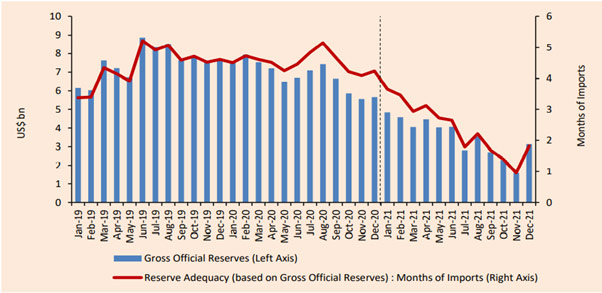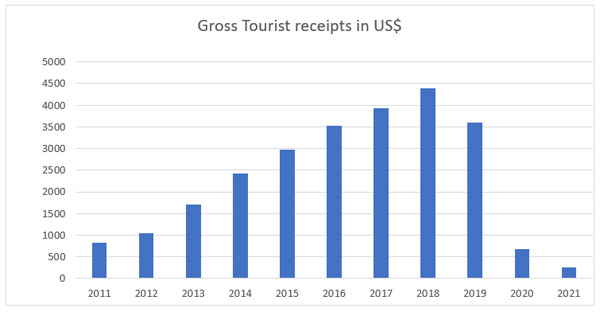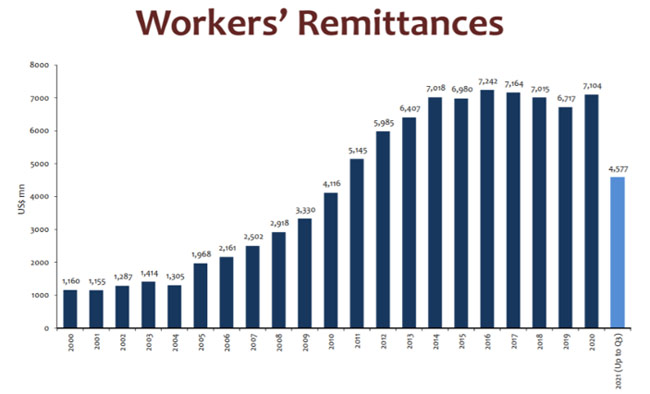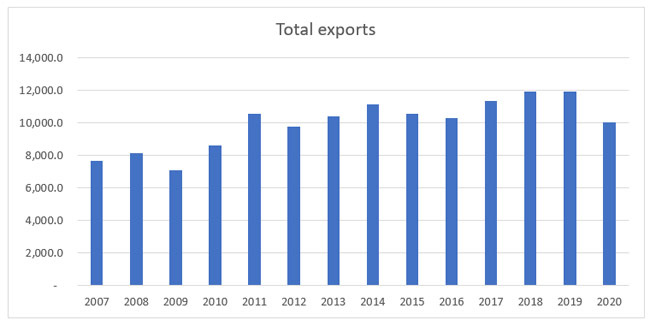You are here
Economic Crisis in Sri Lanka: An Assessment
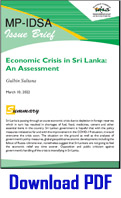 Summary: Sri Lanka is passing through an acute economic crisis due to depletion in foreign reserves which in turn has resulted in shortages of fuel, food, medicines, cement and other essential items in the country. Sri Lankan government is hopeful that with the policy measures initiated so far and with the improvement in the COVID-19 situation, it would overcome the crisis soon. The situation on the ground as well as the analyses of government’s policy measures, global geopolitical-economic developments including the fallout of Russia–Ukraine war, nonetheless suggest that Sri Lankans are not going to feel the economic relief any time sooner. Opposition and public criticism against government’s handling of the crisis is intensifying in Sri Lanka.
Summary: Sri Lanka is passing through an acute economic crisis due to depletion in foreign reserves which in turn has resulted in shortages of fuel, food, medicines, cement and other essential items in the country. Sri Lankan government is hopeful that with the policy measures initiated so far and with the improvement in the COVID-19 situation, it would overcome the crisis soon. The situation on the ground as well as the analyses of government’s policy measures, global geopolitical-economic developments including the fallout of Russia–Ukraine war, nonetheless suggest that Sri Lankans are not going to feel the economic relief any time sooner. Opposition and public criticism against government’s handling of the crisis is intensifying in Sri Lanka.
Sri Lanka is passing through an acute economic crisis due to depletion in foreign reserves. There has been a decline in foreign reserves since August 2020, but in November 2021 it dipped to a precarious level (see Figure 1). It was just enough for meeting one month’s import. A month later, there was a slight increase but even then, it was not enough for two months’ import.1 Reportedly, the gross foreign reserves dropped 24 per cent further in January 2022 to US$ 2.3 billion.2
Depletion in foreign reserves has led to uncertainty about Sri Lankan government’s ability to account for import of essential items and debt servicing. Sri Lankan authorities have acknowledged that they are facing increasing difficulty in settling the import bills due to the dollar crunches, particularly for import of fuel for daily requirements. The government and the Central Bank of Sri Lanka (CBSL) are however, confident that Sri Lanka will not default in debt servicing due to the current economic crisis.3 The Governor of the CBSL believes that the pressures on the economy will ease soon with a steady inflow of forex. The situation on the ground as well as the analyses of government’s policy measures and global geopolitical-economic developments including the fallout of Russia–Ukraine war, nonetheless suggest that a state of uncertainty is hovering over Sri Lankan economy.
Figure 1. Gross Official Reserves
Foreign Reserves Crisis in Sri Lanka
Since its independence, trade deficit has been a consistent feature of Sri Lankan economy, as its import bill has always been more than the revenue earned through export. Huge amount of the foreign exchange earned is being consumed to pay for the import bill for years. In recent years, debt-servicing commitment of the government has put additional pressure on the foreign reserves. On the other hand, foreign exchange inflow to the country declined first due to the impact of Easter Sunday attack on tourism sector in 2019 and then due to the outbreak of global pandemic which severely affected all the main foreign currency earning sectors of Sri Lanka, i.e., tourism, remittances, and export (See Figures 2, 3 and 4).
Figure 2. Gross Tourist Receipts in US$
Figure 3. Workers’ Remittances
Figure 4. Total Exports
As the government could not raise adequate liquidity owing to the unprecedented adverse market conditions, the CBSL continued to provide liquidity from the foreign reserves since 8 April 2020. Between 8 April and 22 June 2020, the Central Bank settled US$ 1,007 million of government debt utilising the Central Bank’s foreign reserves.8 Debt commitment for the period July 2021–July 2022 is approximately US$ 5–7 billion.9 Reduction in the inflow of the foreign reserves at a time when the outflow is significant has made the current foreign crisis worse in the recent years.
Due to the foreign reserves crisis, the country is facing severe fuel shortages leading to daily power cuts, shortage of food, medicines, cement and other essential items. Long queues in front of grocery stores, pharmacies and fuel depots in many parts of Sri Lanka indicate the shortage of essential items. Importers are finding it difficult to get Letter of Credit (LOC) issued from the banks due to lack of foreign currency in the country. As a result, many of the containers are stuck at the Colombo port for several days since payments are not settled.
Due to shortage of fuel, many power plants have to be kept shut, which is resulting in power crisis in the country. Some power plants are resorting to hydro energy using the waters basically used for irrigation purposes. Due to insufficient rains and increased use of reservoirs for the power plants, water shortage is anticipated which, as per experts, will badly affect agricultural production and may lead to food crisis. According to the All-Island Private Pharmacy Owners' Association, a severe drug shortage is looming as the existing back-up stocks of medicines are due to be used up within three months. Reportedly, Sri Lanka has a five-percentage shortage of required medicines.10
Another fallout of the depletion of foreign reserves is downgrading of Sri Lanka’s sovereign ratings by the international rating agencies.11 It has impacted the investors’ confidence to invest in Sri Lanka as the country has been put in the ‘high-risk’ category of defaulting the debt servicing.
There have been calls for effective measures by the government to deal with issues arising out of depletion of foreign reserves.
Measures Taken
Sri Lankan government perceives that the policy of preceding governments over the years to import more than the revenue earned has led to the current foreign-exchange reserves crisis. Loans taken from multilateral institutions have also been believed to be responsible for leading the country to a crisis situation. In addition to this, the COVID-19 pandemic has intensified the crisis, and therefore, one of the major policy priorities for the government is to reduce the import expenditure. Several other ‘homegrown measures’ have also been initiated to reduce capital outflow and increase inflow to strengthen the foreign reserves. The government has approached bilateral partners for loan, credit and currency swap facility to deal with the issue of settling import and debt. Special attention is also being given to boost investors’ confidence while dealing with the crisis situation by not defaulting on debt-servicing.
Import Restrictions: The Sri Lankan government has banned import of luxury vehicles, chemical fertilisers and food items like turmeric to prevent foreign currency outflows. Import ban on Motor Vehicles has been in effect since March 2020. The government of Sri Lanka has restricted the import of chemical fertilisers and agrochemicals (insecticides and herbicides) in May 2021.12 Even though the government justifies the ban to promote organic farming in the country, prevention of outflow of foreign currency was also a factor behind the chemical fertiliser import ban policy. Before the ban, Sri Lanka used to spend around US$ 400 million annually on fertiliser imports and more than US$ 7 million for turmeric imports.13 US$ 1.5 billion was spent in 2018 on vehicle imports.14 The government’s justification for the import ban is that it would prevent outflow of foreign currency and encourage domestic production which could lead to growth of exports.
Restrictions on forward contracts of foreign exchange: In view of the need to avoid excess volatility in the foreign exchange market, the CBSL has directed the licensed commercial banks to refrain from entering into forward contracts of foreign exchange for a period of three months.15
Enhancing Remittance Inflow: To enhance remittance inflows to the country, the government has introduced several policy initiatives like: proposal to diversify the foreign employment market which is now mostly dependent on the Middle Eastern countries; establishing a contributory pension scheme for migrant employees; and to pay Sri Lankan Rs 2 per dollar above the normal exchange rate for the foreign exchange remittances converted at licensed banks. A Special Deposit Account scheme has also been introduced to attract more inward remittances to the country.16
Assistance from Bilateral Partners: Government of Sri Lanka is approaching bilateral partners for assistance to deal with the current economic crisis in the form of loans and currency swap facilities. Bangladesh has extended US$ 200 million currency swap facility. China extended US$ 1.5 billion swap facility. Sri Lanka has also received US$ 700 million from China Development Bank. India has so far committed financial assistance to the tune of US$ 2.4 billion which includes: (a) US$ 400 million under the SAARC currency swap arrangement; (b) deferral of A.C.U. settlement of US$ 515.2 million by two months; (c) US$ 500 million for importing fuel from India; and (d) US$ 1 billion for importing food, essential items, and medicine.17 In addition to this, Indian Oil Corporation has supplied 40,000 Metric Tonnes of fuel on 60 days credit.18 As part of the financial assistance package, India has also agreed to positively contribute to enhance Sri Lanka’s energy security by signing an MoU to jointly develop the Trincomalee oil tank farms; and by providing all kinds of assistance to tap Indian tourists for strengthening Sri Lanka’s tourism sector as well as enhancing Indian investments in Sri Lanka. Pakistan and Qatar have also agreed to provide assistance. Pakistan has agreed to extend US$ 200 million credit lines to import cement, basmati rice and medicines manufactured in Pakistan.19 Details of the same are yet to be finalised between the two countries. Reportedly, the CBSL has commenced discussions with the Qatar Central Bank to obtain a swap of over US$ 1 billion.20
Boosting investors’ confidence: To boost investors’ confidence, the government has made provisions for Special Deposit Accounts. The government is determined not to default in debt servicing commitment despite the shortages of foreign exchange. Despite repeated calls from the opposition parties, the government has decided not to request the lender to restructure the debt payment.
No to International Monetary Fund (IMF) Bailout:Sri Lanka is not keen to approach IMF for bailout, as the IMF assistance comes with strings attached, which would impose additional burden on the people who are already facing challenges due to the pandemic and the ongoing economic crisis, according to the government. The incumbent government is also of the view that the IMF programmes implemented in Sri Lanka from time to time worsened the country’s economic problems. Though the government is confident that it would be able to deal with the situation without IMF bailout, however, statements from the ruling party leaders suggest that the government might get technical advice from the IMF.
Efficacy of Government Measures
The way the Sri Lankan government is handling the situation is not being appreciated by the economists and opposition parties. The critics are arguing that the government is focusing on short-term measures and on particular segments without taking a holistic approach to the overall economic interactions. It is argued that the import restrictions in the short period may have reduced expenditure and thus trade balance, however, continuing ban on imports would affect the exports too because export industry of Sri Lanka is largely dependent on import of intermediate capital goods. Import ban has affected many of the importers adversely. The government’s policy of banning the chemical fertilisers has also been severely criticised as it is going to affect the agricultural production and could escalate food insecurity in the country. Import ban has increased smuggling and illegal trade of banned items resulting in price rise. Selective control on imports has been used by the government in the past too whenever there was a fall in the revenue earned from exports, from 1948 till 1960s.21 However, it only gave short-term relief and did not contribute much to the improvement of overall economic situation of the country.
The delegation of the European Union (EU) and the Embassies of France, Germany, Italy, the Netherlands and Romania in a joint statement issued on 19 November 2020, criticised Sri Lankan government’s import restrictions arguing that a prolonged import ban is not in line with World Trade Organization regulations and it is also likely to have a negative impact on Sri Lankan and European businesses, and on Foreign Direct Investment.22
The bilateral assistance in the form of currency swap facility received from Bangladesh, China and India has helped Sri Lanka to slightly improve its Gross Official Reserves, and facilitated to settle the debt servicing that was due in the month of January 2022. Indian assistance has also helped in dealing with the fuel shortages. Sri Lanka is relying heavily on the US$ 1 billion from India to foot the import bill of the food and medicines. Full realisation of the assistance offered by India is depending on completion of ministerial level formalities. The finance minister of Sri Lanka is likely to visit India for the same this month. China has not yet made any official commitment on Sri Lanka’s request for loan to repay the Chinese loans. According to the Sri Lankan Ambassador to China, discussions with the Chinese in this regard are at an advanced stage.
Though the incumbent government is hopeful, Sri Lanka cannot totally depend on the bilateral assistance alone to overcome this crisis. Although the assistance is giving Sri Lanka a breathing space to manage the debt servicing and settlement of import bills with limited foreign reserves, it is worth noting that these assistances are coming in the form of loans. It is believed that the current economic situation is going to prevail at least for another two or three years. Sri Lanka needs a bailout with long-term, low-interest loans, with a grace period long enough to sustain during the current economic situation. Opposition parties and many experts in Sri Lanka believe that relying only on bilateral assistance is not enough, and are therefore pressing the government to approach IMF.
Conclusion
The Sri Lankan government is hopeful that the foreign exchange situation will improve soon with the materialisation of envisaged inflows from the bilateral partners, as well as non-debt creating foreign currency inflows in the coming days. It is expected that the foreign exchange earnings from the tourism sector and remittances will improve soon. Despite the optimism of the government and the CBSL, it is unlikely that people of Sri Lanka are going to feel economic relief in the near future.
Sri Lanka’s debt burden is huge. Its debt service obligation for the period July 2021 to 2026 is about US$ 29 billion.23 Uncertainty still exists about the improvement of the tourism and export sector. The escalation of war between Russia and Ukraine will have repercussions for Sri Lanka, as both Ukraine and Russia are important markets for Sri Lankan tourism. Of the total tourists who visited Sri Lanka this year till 11 February, Russians accounted for 15.8 per cent and Ukrainians accounted for 8.7 per cent.24 Lack of tourists from these countries due to the war will have implications for the tourism sector. Also, the Russia–Ukraine war has already caused global oil price rise, which would create further problems for Sri Lanka to import fuel for its daily requirements. The escalating situation between Ukraine and Russia may also impact the export as they are important markets for Sri Lankan tea.25
Before the pandemic, Sri Lanka was dependent on a large number of Chinese tourists. About 1,67,863 Chinese tourists visited Sri Lanka in 2019.26 It is not clear yet as to when China would lift the ban on people’s movement in and out of the country.
EU is the second largest market for Sri Lanka’s export sector. EU’s Generalised Scheme of Preferences (GSP+) facilitates duty-free entry of the Sri Lankan products to EU. Unsatisfied with Sri Lanka’s human rights records, EU Parliament has threatened to review the GSP+ scheme extended to Sri Lanka through a resolution in June 2021.27 In the resolution, Sri Lankan government was asked to take proactive measures to improve its human rights records including abolition of the Prevention of Terrorism Act (PTA). While the government has tabled a bill in the Parliament to amend the PTA, not many proactive measures are visible on the concerns mentioned in the EU resolution. UN High Commissioner for Human Rights Michele Bachelet took a critical stand in her report presented during the 49th Session of the United Nations Human Rights Council (UNHCR) beginning on 4 March 2022 for not implementing its pledge to establish war crimes accountability mechanisms. The report also asked the government to take “further steps to address the fundamental problems with the PTA and undertake deeper legal, institutional and security sector reforms that were critically needed to put an end to impunity and prevent any reoccurrence of past violations”.28 In its response Sri Lanka alleged that the report had an “intolerably intrusive character and there was a clear element of discrimination within it”. However, during the interactive dialogues following the presentation of the report, many of the participant countries asked the Sri Lankan government to “fully consider the numerous and consecutive recommendations made by various United Nations mechanisms and organizations”. Sri Lanka’s attitude towards those recommendations in coming days will determine the flow of assistance from the Western countries particularly from the EU to deal with the economic crisis. Withdrawal of GSP+ facility to Sri Lanka by the EU will be a big obstacle in the growth of export sector.
At the domestic level, the government has to face the wrath of common people, opposition parties and even disappointment of some of the coalition partners because of its handling of the economic crisis, pandemic, overall governance and foreign affairs.
All these factors cumulatively will pose serious challenges for Sri Lanka to overcome the current crisis. Even though the government as of now has refused to approach the IMF for assistance, it might be compelled to accept the same at a later date.
Views expressed are of the author and do not necessarily reflect the views of the Manohar Parrrikar IDSA or of the Government of India.
- 1. “External Sector Performance - December 2021”, Press Release of Central Bank of Sri Lanka, 11 February 2022.
- 2. “Sri Lanka Foreign Reserves Drop to US$2.3bn in Jan 22”, Economynext, 7 February 2022.
- 3. “Reiteration of Sri Lanka’s Commitment to Service Forthcoming Debt Obligations”, Central Bank of Sri Lanka, 9 February 2022.
- 4. “External Sector Performance - December 2021”, No. 1.
- 5. “Central Bank of Sri Lanka”, Statistics on External Sector.
- 6. Ibid.
- 7. Ibid.
- 8. “Public Debt Management”, Central Bank of Sri Lanka.
- 9. “Sri Lanka’s Foreign Debt Payment Challenges in ’22”, Daily FT, 24 September 2021.
- 10. “Massive Drug Shortage within Three Months: Pharmacy Owners’ Assn.”, The Daily Mirror, 23 February 2022.
- 11. “Rating Reports Sri Lanka”, Fitch Ratings, 2 July 2021.
- 12. “Stringent Rules to Control Pesticide Imports Amidst Smuggling”, The Sunday Times, 3 October 2021.
- 13. “Importation of Chemical Fertilizers will be Stopped Completely”, Presidential Secretariat, Government of Sri Lanka,22 April 2021;“Turmeric Sufficient for Local Use will be Harvested Soon - Agri Minister”, The Daily Mirror, 3 December 2020.
- 14. Sumudu Chamera, “Vehicle Import Ban: Importers to Begin Talks with Govt.”, The Sunday Morning, 21 January 2021.
- 15. “Banking Act Direction No.2 of 2021”, Monetary Board of Central Bank of Sri Lanka,25 January 2021.
- 16. “Annual Report 2020”, Central Bank of Sri Lanka,30 April 2021.
- 17. Nirupama Subramanian, “Relationship with India is Our Most Important Relationship, Period: Sri Lanka’s High Commissioner to India”, The Indian Express, 24 January 2022.
- 18. “Sri Lankan FM to Visit India to Formalise Economic Relief Package”, The Hindu, 15 February 2022.
- 19. Nishel Fernando, “SL Begins Groundwork to Borrow US$ 200mn from Pakistan”, The Daily Mirror, 2 February 2022.
- 20. “$ 1 b Swap with Qatar to Strengthen Reserves”, The Sunday Morning, 13 December 2021.
- 21. Saman Kelegama, “Development in Independent Sri Lanka: What Went Wrong?”, Economic and Political Weekly, Vol. 35, No. 17, 22–28 April 2000, pp. 1477–90.
- 22. “Joint Statement”, Delegation of the European Union to Sri Lanka and Maldives, Colombo, 19 November 2020.
- 23. “Rating Reports Sri Lanka”, No. 11.
- 24. Mahadiya Hamza, “Crisis-hit Russians, Ukrainians Boost Sri Lanka’s Tourism Recovery”, Economynext, 14 February 2022.
- 25. Sunimalee Dias, “Multiple Impacts in Sri Lanka from Ukraine War”, The Sunday Times, 27 February 2022.
- 26. “Annual Statistical Report 2019”, Sri Lanka Tourism Development Authority.
- 27. “European Parliament Resolution of 10 June 2021 on the Situation in Sri Lanka, in particular the Arrests under the Prevention of Terrorism Act (2021/2748(RSP))”, European Parliament, 10 June 2021.
- 28. “Human Rights Council Holds Separate Interactive Dialogues on the Human Rights Situations in Eritrea and in Sri Lanka”, United Nations Human Rights Office of the High Commissioner, 4 March 2022.



